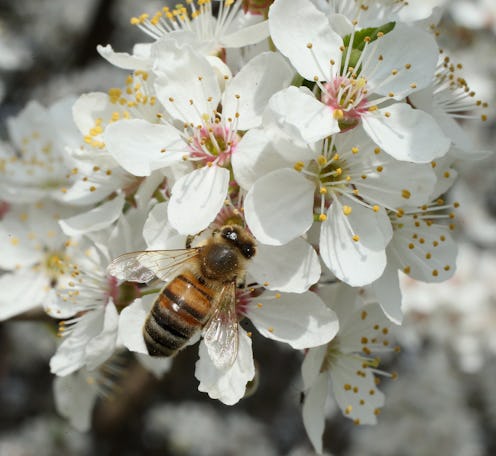Life
A New Study Says Your Allergies Could Be Affecting Your Mental Health — Here’s How

It's spring, which means sunshine, flowers and — for those of us who happen to have hay fever — sneezing inelegantly all over the shop. However, springtime and its associated allergies may have another interesting consequence, according to a new study just published in Frontiers In Psychiatry — allergies and mental health may in fact be related. The study found that hay fever and asthma may increase your likelihood of a psychiatric disorder. It's an interesting link and we're not quite sure what lies behind it, but it's opened up a new realm of ideas about the relationship between allergens and psychological health.
The study itself was conducted in Taiwan over a period of 15 years using 186,588 people, 46,647 of whom have allergies of some kind. The cherry blossoms across Taiwan are famously beautiful in spring, but they don't exactly make life easy for people who have pollen allergies. The study looked at a broad range of allergy patients who suffered from several combinations of bronchial asthma, allergic rhinitis, and atopic dermatitis. Bronchial asthma is a chronic inflammation of the airways, allergic rhinitis is classic hay fever (snuffly, inflamed nose), and atopic dermatitis is better known as eczema, which flares up in response to a variety of allergens, as well as stress. Pollen isn't the only trigger here; asthma and eczema can also flare up in response to things like laundry detergents and air pollution.
The 15-year study found that, when it comes to your allergies, it's not having them that counts — it's what combination you have that seems to affect your mental health. People who just had eczema, or had a combination of hay fever and eczema (which is pretty common), weren't at increased risk of having a psychiatric disorder. But having asthma or hay fever on their own or together, asthma and eczema, or all three at once was "associated with a higher risk of psychiatric disorders." 10.8 percent of the allergic study subjects had a psychiatric issue, compared to 6.7 of allergy-free people. That's an interesting and sizable difference.
So what's going on here? There are various explanations afoot, but the study didn't look at any in detail; it just established the link. One possible reason that people with these allergy combinations might be more vulnerable to psychological disorders is that being allergic is actually pretty stressful. Eczema is painful, asthma and rhinitis are physically unpleasant, and both the conditions themselves and the treatments take up time and energy. It's still difficult to deal with serious allergies, particularly in combination. Plus, people with sensitivity to environmental allergens, like pollen and air pollution, might isolate themselves inside, which is never a good thing for mental health.
Another potential explanation is inflammation, which is part of the body's natural immune response to threats. Allergies set off tissue inflammation inside the body, and high inflammation levels themselves have been tied to a higher likelihood of mood disorders, though it's not clear whether they're cause or effect. A study in 2017 found that people with depression tend to have far higher levels of a particular inflammation marker in their blood, and inflammation has also been linked to anxiety. It's possible that people with allergies are experiencing spiked inflammation levels that are somehow also interfering with mood, but it's not really clear how that link works just yet.
It's important to remember that a relationship isn't necessarily a cause. That's science 101. So just because people with allergies are more likely to have mental illness doesn't mean that one is necessarily causing the other; there could be certain other factors in play we don't know about. And mental health issues have been linked to the immune system in many complex ways. It's a big and interesting puzzle. But if you're feeling low after a dose of antihistamines and a coughing fit, it's worth considering that it's not just a bit of annoyance.